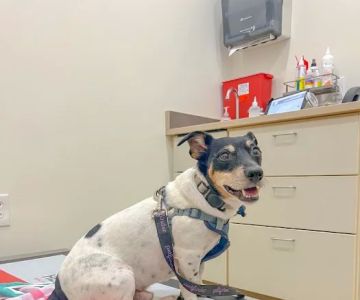What Is the Qualification for Veterinary Doctor? Complete Guide to Becoming a Veterinarian
If you’ve ever wondered how to become a veterinary doctor and what qualifications are required, you’re in the right place! As an animal lover, you may have considered a career where you can care for animals, diagnose health conditions, and make a difference in their lives. Becoming a veterinarian is a rewarding yet challenging journey, requiring years of education, training, and practical experience. In this article, I’ll guide you through the necessary steps, qualifications, and skills required to become a veterinary doctor.
1. Understanding the Role of a Veterinary Doctor
Before diving into the qualifications needed, it's essential to understand the role of a veterinary doctor. Veterinarians are medical professionals who diagnose and treat illnesses, injuries, and diseases in animals. They work in various settings, including private practices, animal hospitals, research institutions, and even zoos or farms. A veterinarian’s job often involves physical examinations, performing surgeries, prescribing medication, and advising pet owners on the proper care of their animals.
2. The Educational Path to Becoming a Veterinary Doctor
Becoming a veterinary doctor requires significant education. Let’s break it down into manageable steps:
- Step 1: Obtain a Bachelor’s Degree – While no specific major is required, most aspiring veterinarians complete a Bachelor’s degree in fields like biology, animal science, or chemistry. This undergraduate degree lays the foundation for veterinary school by covering essential science courses.
- Step 2: Gain Experience with Animals – During your undergraduate years, it’s crucial to gain hands-on experience with animals. Volunteering or working at animal shelters, farms, or veterinary clinics can give you a better understanding of animal care and improve your veterinary school application.
- Step 3: Apply to Veterinary School – Veterinary school is a highly competitive program. Applicants typically need strong academic records, particularly in the sciences, as well as relevant experience with animals. Veterinary school usually lasts four years and culminates in a Doctor of Veterinary Medicine (DVM) degree.
- Step 4: Complete a Veterinary Internship or Residency – After obtaining a DVM degree, many veterinarians choose to specialize in specific areas, such as surgery or dermatology, by completing internships or residencies. This additional training allows them to deepen their expertise in particular aspects of animal health.
3. The Licensing Process for Veterinarians
After completing veterinary school, aspiring veterinarians must pass several exams to obtain a license to practice. The primary exam is the North American Veterinary Licensing Examination (NAVLE), which tests knowledge in various areas of veterinary medicine. Some states may also have additional licensing requirements, such as state exams or background checks.
Once licensed, a veterinarian can legally practice in their state. However, continuing education is often required to maintain a license and stay up to date with advancements in the field.
4. Skills and Attributes of a Successful Veterinary Doctor
Beyond formal education and training, certain skills and qualities can make someone an excellent veterinary doctor. These include:
- Strong Communication Skills: Veterinarians must communicate effectively with pet owners, explaining diagnoses, treatment options, and medical procedures clearly and empathetically.
- Attention to Detail: Veterinary doctors need to have a keen eye for detail to diagnose health conditions accurately, interpret lab results, and ensure precision during surgeries.
- Compassion and Patience: Working with animals can be emotionally challenging, especially when dealing with sick or injured animals. Compassion and patience are essential traits for veterinarians in providing the best care for animals and comfort to their owners.
- Problem-Solving Skills: Veterinary doctors need to assess complex medical situations and come up with effective solutions for treating animals.
5. Career Opportunities and Specializations in Veterinary Medicine
As a veterinary doctor, you have the opportunity to specialize in various fields, depending on your interests and skills. Some of the most popular veterinary specializations include:
- Small Animal Practice: Focuses on pets like dogs, cats, and small mammals.
- Large Animal Practice: Involves treating livestock, such as cows, horses, and pigs.
- Emergency and Critical Care: Specializes in handling urgent, life-threatening situations.
- Surgery: Some veterinarians choose to specialize in surgical procedures for animals, including spaying, neutering, and orthopedic surgery.
- Dermatology: Focuses on treating skin conditions in animals, a rapidly growing field due to increasing pet allergies and skin issues.
In addition to these specialties, veterinarians can work in fields such as research, public health, wildlife conservation, and even teaching at veterinary schools. The possibilities are vast!
6. The Financial Investment and Job Outlook
Becoming a veterinary doctor requires a significant financial investment in education. The cost of veterinary school can be expensive, and many students graduate with substantial student loan debt. However, the potential earnings for veterinarians are also promising. According to the U.S. Bureau of Labor Statistics, the median annual wage for veterinarians is approximately $99,000, with some specializations earning higher salaries.
As for job outlook, the demand for veterinarians is expected to grow in the coming years due to increasing pet ownership and the need for animal care in various industries. This growth presents exciting opportunities for aspiring veterinarians.
7. Real-Life Case: The Journey of a Veterinarian
Let’s take a moment to hear from a friend of mine, Dr. Emily, who became a veterinarian after years of hard work. She began by volunteering at a local animal shelter during her college years and knew from that moment that caring for animals was her calling. After years of studying and completing internships, she now runs her own animal clinic, specializing in dermatology for pets. Dr. Emily’s story is a testament to the passion and dedication it takes to become a successful veterinary doctor.
8. Conclusion: Taking the First Step Towards Becoming a Veterinary Doctor
Becoming a veterinary doctor is a fulfilling and challenging career path. By completing the necessary education, gaining experience with animals, and obtaining the required certifications and licenses, you can start your journey to helping animals and making a difference in the lives of pet owners. If you're ready to embark on this rewarding career, start by researching veterinary schools, internships, and continuing education opportunities to make your dream of becoming a veterinary doctor a reality.











